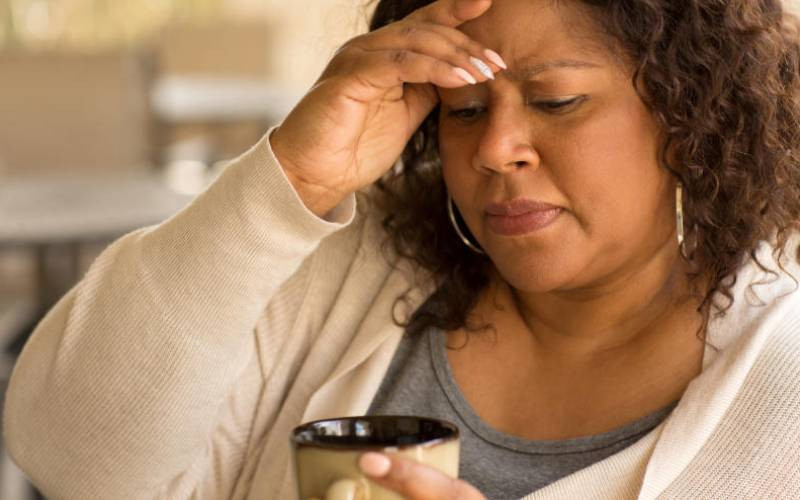
"I felt like I had gone from 40 years to 90. I was confused, I mean, what do you mean menopause at 40," says Jackie* a 46-year-old mother of two.
Jackie says that her menses became irregular, but she never gave it much thought because even in her younger years her menses were not regular.
"I began having hot flushes, and sex became uncomfortable because my vagina would be so dry. The signs were there but I was like menopause at 40? No way," she says
Menopause is a stage in life when you no longer can get pregnant. The average woman or person assigned female at birth (AFAB) goes through natural menopause in their early 50s.
Premature menopause happens to women before age 40 and early menopause happens before age 45. The symptoms for these conditions are similar to natural menopause and the causes are often unknown.
Fertility expert Dr Sarita Sukhija of Myra IVF Centre says that early menopause starts when a woman is 35 years and below.
"80-90 per cent of the women will start menopause from the ages of 45-55, it's only 1 to 2 per ent of women who will have menopause before the age of 40, that is what we call early menopause." She says
Dr Sukhija adds that women who experience early menopause have low ovarian reserve. Meaning they have fewer eggs compared to other women their age hence having difficulty conceiving.
- Keep your home warm with these tips
- What to do if you feel dizzy after a meal
- Are you unhappy?
- The changing face of families
Keep Reading
Jackie adds that she was devastated since she had plans of adding more children, she wanted four, and was postponing because she wanted to finish her master's degree first.
"I was just wondering why me, why am I part of the one per cent of women who go through this. I was wondering was it the smoking I did in my twenties that caused this, so many questions," she says
However, after seeking medical assistance, especially mental health assistance and support from her husband, she felt like she could face another day.
"If it were not for therapy I wouldn't be here. I thought my husband was going to leave me. But he kept telling me we already have two children, we are okay," she says
Jackie says that she has become an advocate of regular check ups for women in her circle. "My sisters are tired of me telling them to go for check ups as often as possible. I always ask if their menses are regular and if they are keeping track of their health."
Symptoms of diminished ovarian reserve include: Heavy menstrual flow, difficulties getting pregnant, miscarriages and changes in the menstrual cycle.
"In such cases we check the history of the person carefully. Patients whose female relatives, mother sisters and aunts, had early menopause are likely to have early menopause. Women who have undergone surgeries on the ovaries, like cysts and endometriotoc systems, women who have undergone chemotherapy and radiotherapy," she says
Tests to check early menopause include (AMH) Anti Mullerian Hormone. The levels of AMH for fertility are 1.0-4.0. AMH levels help in estimating the number of follicles in the ovaries hence knowing the woman's egg count.
The cost is between Sh7,000 and Sh8,000.
"You can check on any day of the cycle; it has no relation with the woman's period, you can just go give your blood samples. As soon as it starts going below 1.0, it should alarm you that you are left with not so many eggs," says Dr Sukhija
Dr Sukhija advises women whose AMH levels are low 1.0 should plan to conceive as soon as possible or freeze their eggs.
Egg freezing is a procedure where a woman's eggs are harvested from her ovaries and then stored but can be accessed anytime she is ready to carry a pregnancy.
When a woman is ready, according to medics, she can access her frozen eggs and have them fertilised in a lab using a partner's sperm or donor sperm. After the eggs are fertilised in a procedure that does not involve traditional sexual intercourse, the embryo is now implanted in her uterus or a surrogate's uterus.
Dr Sukhija, says that every woman is born with a certain set of eggs.
"When a girl child is in the womb, she has around a million eggs and when she is born, she has about 30,0000 to 40,000 eggs in her ovaries. It is said that when a woman starts her period to the time she gets into menopause, she ovulates about 400 times, every month one egg ovulates and the rest do not grow," Dr Sukhija says.
She explains that the maximum fertility time is between 25 and 35 years since in this age group the eggs can be fertilised easily. After 35, the eggs become older and the embryos could be abnormal.
Another test for early menopause is Ultra Sound.
"You can check the uterus, we can look at the ovaries; how many eggs are there. It is a non-evasive test," she says
Another test is Transvaginal ultrasound. Unlike the regular ultrasound, in transvaginal ultrasound an ultrasound probe that is about 2-3 inches is inserted into a woman's vaginal canal.
The procedure can detect cysts, tumours, fibroids and pelvic infections.
 The Standard Group Plc is a multi-media organization with investments in media platforms spanning newspaper print
operations, television, radio broadcasting, digital and online services. The Standard Group is recognized as a
leading multi-media house in Kenya with a key influence in matters of national and international interest.
The Standard Group Plc is a multi-media organization with investments in media platforms spanning newspaper print
operations, television, radio broadcasting, digital and online services. The Standard Group is recognized as a
leading multi-media house in Kenya with a key influence in matters of national and international interest.

